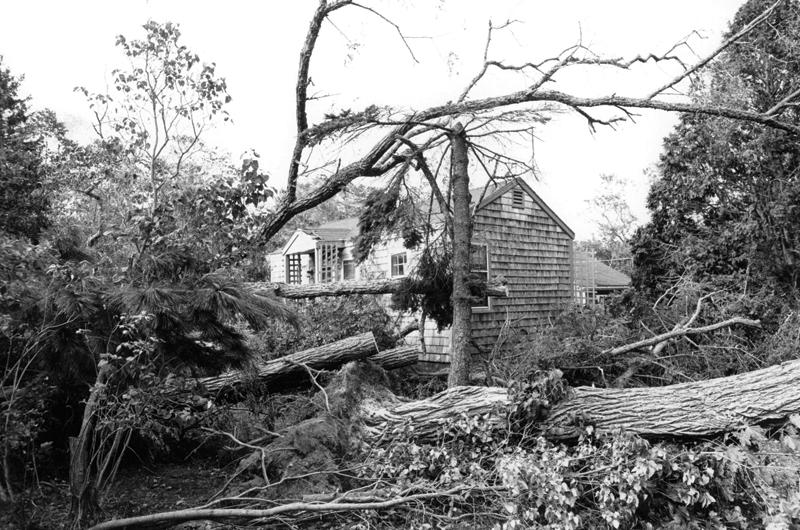Hurricane warnings in late summer are a part of Island life, as reliable as the closing of stores in winter. In a way, they are like those envelopes, rarely opened, that we all receive from Publishers’ Clearinghouse: You may have already won a million dollars!
But once in a blue moon, someone wins that money. And sometimes the meteorologists aren’t just whistling Dixie. So when the warnings come along, we go through the motions. We crowd the grocery and hardware stores, loading up on batteries, water, and flashlights. We line up at the gas stations to make sure our tanks are full. All the while we joke about the inevitable trickle of rain we might get before we lay into the weather people once more about their uselessness. But like that million- dollar envelope, we are nevertheless aware that the Big One is forever lurking.

Hurricane Bob hit twenty years ago this summer and, more significantly for me, three days before my fourteenth birthday. Fourteen is an important rite of passage for a Vineyard kid, because that is when you become eligible for working papers, and can finally join your friends scooping ice cream, selling T-shirts, or herding children on and off the Flying Horses Carousel. I had a job lined up at a little store no bigger than a walk-in closet on Dock Street in Edgartown that sold hair accessories. I would be demonstrating hairdos to customers.
I had it all planned out, and was ready to march right into the town clerk’s office on August 23, get those papers signed, and punch in. I even had my outfit picked out. And then that fuzzy little blob on the evening news weather maps started moving up the right side of the screen, cutting to shots of the East Coast getting pummeled with rain and wind, along with a flimsy promise of what might be in store for us.
My family has always been civically active. For decades my father was a volunteer firefighter and my mother an EMT. My brother is a police officer. Storms tend to have an additional white-knuckle effect on those who send their loved ones out into the throes of disaster to aid others. We have to take it seriously. So we taped up the windows, loaded up on essentials, and hunkered down. (Six years earlier, I had observed similar preparations as we anticipated Hurricane Gloria, the previous “Big One.” My sister and I made welcome signs for the storm and hung them in the windows. It was a good storm alright, but we’ve had worse nor’easters.)
Hurricane Bob was a bad dream in comparison. It hit, and it hit hard. On August 19, 1991, it made landfall midday as a Category Two hurricane with sustained winds over a hundred miles per hour, accompanied by heavy rain and storm surges approaching ten feet. Hundreds of vacationers fled to shelters. Storm-tossed boats broke their moorings and were flung upon beaches and jetties. Trees, utility poles, and wires lay strewn across the Island’s roads. Overall, it was significant enough that the name “Bob” was later officially retired by the hurricane namers.
In its aftermath, we lost power for days. Not as long as others did, luckily for us, but to this day I try to get in and out of a refrigerator as quickly as possible, because I remember how important it is to conserve that little bit of cold left. My father and a team of volunteers spent long hours removing the trees on our half-mile-long dirt road, pumping flooded basements, and dealing with electrical issues as power was slowly restored.
When the post-storm cleanup finally settled and my long-awaited employment began, the fallout from the storm was still evident. A display of body oils near the store’s entrance attracted swarms of yellow jackets whose homes had been destroyed. We had to swat them out of the store with hand mirrors. I had nightmares about them for months.
The stories about Bob were incredible. I remember hearing about someone who had moved his brand new car to the side of his house away from the trees so that it would not get crushed, but then a tree came down and knocked the chimney off the house onto the car. Water rose up to the doors of Among the Flowers Café. A large boat was swept up and out of Edgartown harbor into the pool at the Harborside Inn. Unbelievable.
Now I understand what is possible when that gray blob starts moving up the weather map. I had family in Louisiana displaced by Hurricane Katrina, and I’m reminded on annual visits how a storm can change the face of a city, and that we’ve had it pretty good in comparison.
For a fourteen-year-old whose main concern about Hurricane Bob was the early interruption of a career in retail, I got out okay. By the summer of 1992, I was happily spinning cotton candy at the Flying Horses, once again secure in the fact that around here, “hurricane” most often means “a little bit o’ rain.”




